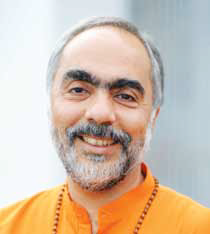
 Swami Swaroopananda,
Swami Swaroopananda,
Director in Charge, Chinmaya International Residential School,
Coimbatore, Tamil Nadu
“Education should develop understanding, pride and love for our culture and the nation,” says Swami Swaroopananda, Director in Charge, Chinmaya International Residential School, Coimbatore, Tamil Nadu
After 17 years of operation, where does the school stand now?
Chinmaya International Residential School (CIRS) was established in June 1996, and has entered the 18th year, this academic term. CIRS today has been rated on top in various rankings. The school has been producing students who are well educated in their secular studies. They are also infused with a higher vision for life and are leading life with nobler aspirations. Identifying the right location and establishing it initially was indeed challenging. Materialising Swami Chinmayanandaji’s vision into a practical education system was the first hurdle. Renowned educationists, who have been part of the Chinmaya Mission helped shape the systems in school. The difficulties of identifying the right location and ushering in funds for the project were also overcome. The trust that people had in the Chinmaya Mission took care of the initial admissions. The school’s excellent performance is taking care of the admissions now. Dedicated selfless service of many experts in the field of education, coupled with staff that is enthused with the vision of Education gives us the strength with which all challenges are won over.
How many schools are there under the umbrella? How do you operate these schools?
The Chinmaya Education movement encompasses 80 Schools in India and one in Trinidad. Most of the Chinmaya Vidyalayas are run in the COCO model while the franchise model is also adopted in the rarest of cases. The schools are managed by Chinmaya Mission Trusts with the people of the local place as the Trustees. The Chinmaya Education Cell guides, trains, monitors and evaluates the systems of imparting education, as well as the administrative policies to be in place in the various schools. Unlike a commercially run venture, the Chinmaya Education Movement has no agenda of expansion or profitability. Being non-commercial by nature, it responds to the need of the place and the people. Hence, as and when there is a demand for a Chinmaya Vidyalaya and people of the local community are ready to support it and run it in line with the vision, the Chinmaya Vidyalayas are set up
What is the biggest challenge of the school today, and what are we doing to address it?
Diminishing values and extraordinary (undue) emphasis on materialism is the biggest challenge in society. This has not spared even the education system. Decline in values in the society is creating conflicts in the child. Even from a child’s perspective, education is only a resultoriented commercial endeavour, rather than a discovery and enquiry-oriented enterprise. Training to score marks has superceded the need to be educated. The craze to be materialistically succesful has overtaken the need to be humane. To fulfil the true purpose of education in the process of satisfying the materialistic demands is one big challenge in all schools. These issues have to be addressed jointly by the educators and the parents. Parents need to join hands with the school to create this conviction.
How can ICT help in educating young minds?
ICT has already become an integral part of education. The visual impact while teaching lessons have enhanced the teaching-learning process to a large extent. Presentations and research are all part of the system these days. The whole world is moving towards ICT empowered learning. There is a big need to pool all resources and make them available on a common platform. Education in India is still lacking the aspect of application. Students gather a lot of information. Yet, they are impaired for want of the knowledge to use it hands on in the real world. ICT could go a long way in creating opportunities for this kind of education. At the same time, ICT engages students in the virtual world and subtly discourages the student from interacting, observing and learning from the real world. Education in moral responsibility of using ICT in its most beneficial way also should include communicating the understanding of when it is to be kept away.




















